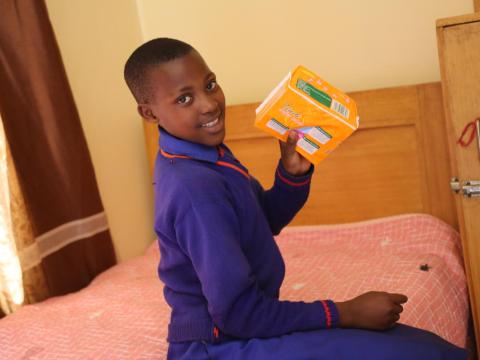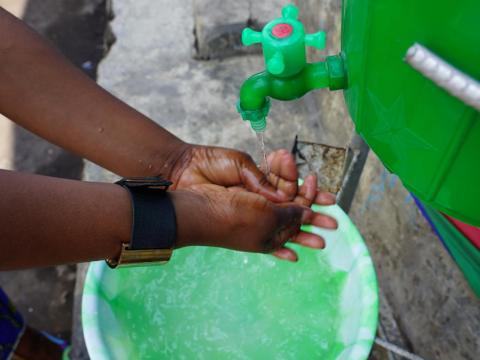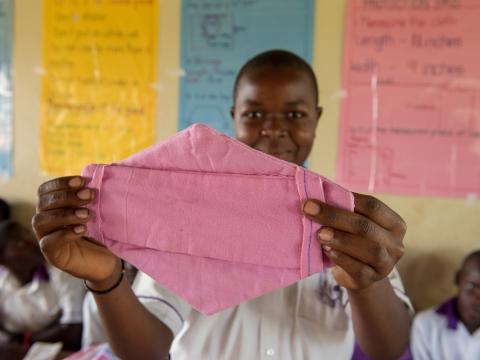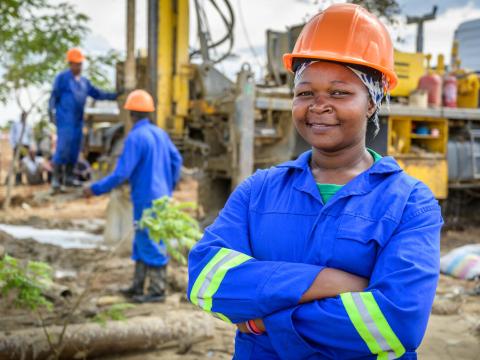
Periods: Private, but not a secret – it’s time to normalise
For Menstrual Hygiene Day, WASH expert Kristie Urich considers four essential pillars to effective menstrual health and hygiene interventions for women and girls everywhere.
...Take a look at WASH UP! Girl Talk project summary here...
It is estimated that half a billion people around the world live without adequate menstrual hygiene. We often think of menstrual hygiene in terms of resources – private toilets, sanitary products, soap, education materials – all of which are critical for managing menstruation. These things are practical and visible – and they can easily be counted and reported to donors.
Perhaps the most important aspects of menstrual health and hygiene are the unseen elements – the emotional, mental and even spiritual impact that “period poverty”, and the associated fear and shame, can bring. It is a loaded issue, requiring both individual and societal responses. The overarching goal of Menstrual Hygiene Day (28 May) is to “build a world where no one is held back because they menstruate”. It is a day to celebrate the movement that is coalescing to normalize periods, and also reflect on what still needs to be done.
I am a parent of a daughter who recently turned 13. Over the last couple of years, as puberty has begun for my daughter, I have had many opportunities to try to practice what I preach in terms of menstrual health and hygiene. How do you support girls who are entering into this phase of life – going through drastic changes, feeling awkward and embarrassed at times, no longer a little kid but not yet an adult? It’s a confusing time for all children – even those living with easy access to education, toilets and menstrual supplies.
As I think about this in my own family, four critical factors come to mind that are essential pillars to effective menstrual health and hygiene interventions for women and girls everywhere.
- Peer support: Especially in the early years of menstruation, adolescents need supportive relationships with peers, both boys and girls. This comes from healthy attitudes and accurate knowledge about puberty and menstruation. Strong peer relationships are critical to this, sometimes, confusing season of life.
- Trusted adults: Whether parents, family members, teachers, faith leaders, or other adults in the community, adolescents need to be supported by trusted adults who will provide accurate and timely information, teach healthy habits, advocate for access to materials, and provide protection and moral support.
- Privacy without secrecy or shame: I try to remind my daughter – periods aren’t a secret, but they are private. Women and girls have the right to dignified, private facilities; accessible and safe menstrual supplies; and discreet disposal or cleaning facilities.
- Policy support: Government policies should remove barriers to access of menstrual hygiene supplies (including removing the “tampon tax” from sanitary products). Education and health policies should ensure that accurate, accessible menstrual education is available for both girls and boys.
These pillars should be woven through all efforts to support menstrual health and hygiene. Achieving this essential support takes investment from a variety of actors, from policy makers, government leaders, implementers, influencers, community members and individuals.
There are many individuals, organizations, governments and coalitions working to sharpen the focus, increase investment and deepen impact of menstrual health and hygiene interventions.
World Vision’s work in schools aims to strengthen these pillars through the WASH UP! Girl Talk programme. Developed together with our partner, Sesame Workshop, this school-based puberty and menstrual health education and behaviour change programme works to build strong knowledge, healthy behaviours, dignified infrastructure, teacher support, and trusting peer relationships.
We must remember than nearly 1.9 billion people menstruate, and do so for an average of 40 years of their lives. This is significant. This is normal. They have the right to menstruate with confidence, not shame; with dignity, not dread; and with support, not isolation.
Listen to the Educate Us Podcast featuring World Vision and Sesame Workshop discussing GirlTalk http://educateus.libsyn.com/4-periods
For the WASH UP! Girl Talk project summary click here
Learn more about World Vision's Water, Sanitation and Hygiene work here.
Kristie Urich is a WASH (water, sanitation and hygiene) Technical Director with World Vision United States. Kristie leads World Vision’s efforts to bring greater transformation through WASH to some of the most vulnerable people, including women, girls, people with disabilities and other marginalized groups. She also leads programmes World Vision implements in partnership with Sesame Workshop, called WASH UP! and WASH UP! Girl Talk. Follow her on Twitter at @Kurich


